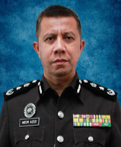
TKP MEOR AZIZI SAPAWI BIN AHMAD SEPUAN
DIRECTOR
GENERAL OBJECTIVES OF THE RADICAL AND HIGH -RISK PRISONERS/DETENTION DIVISION
- Ensure that prisoners or detainees categorized as radical, widespread and high -risk are detained in accordance with established procedures, follow established rehabilitation programs and undergo a safe detention process throughout the term of imprisonment.
SPECIFIC OBJECTIVES OF THE PRISONERS/RADICAL AND HIGH RISK DIVISION
- Ensure that the detention process of radical prisoners / detainees is carried out legally in accordance with existing laws and procedures.
- Ensure the preparation of documentation and profiles of radical prisoners / detainees are prepared based on existing legislation and SOPs.
- Organize, implement and monitor the implementation of rehabilitation programs in an integrated manner with the involvement of other stakeholders.
- Collaborate with strategic partners at home and abroad in an effort to improve the management and rehabilitation of radical prisoners or detainees.
TWO SECTIONS UNDER RADICAL AND HIGH RISK PRISONERS/DETENTION DIVISION
PRISONER REHABILITATION / RADICAL DETENTION SECTION
- To plan policies, coordinate and evaluate programs and activities for the rehabilitation of radical prisoners/detainees and Wide Coverage Prisoners (BLM) implemented in the institution.
- Carry out a study on the effectiveness of the radical prisoner/detainee rehabilitation program within the stipulated period.
- To plan and coordinate human resource needs, estimated operating expenses for equipment and expenditure requirements for radical prisoner/detainee rehabilitation programs in institutions.
- Supervise and update progress reports on rehabilitation programs and skills of radical prisoners/detainees on a weekly basis with the institution.
- Develop, supervise and update the profile of radical prisoners / detainees and Extensive Coverage Prisoners (BLM) involved on a regular basis.
- To plan, monitor and evaluate the implementation of radical prisoner / detainee rehabilitation programs and Wide Coverage Prisoners (BLM) conducted by approved parties.
- Organize, manage and monitor the implementation of rehabilitation and reintegration activities that involve cooperation with families and external parties for radical prisoners/detainees.
- Review and improve modules as well as aspects of rehabilitation support (infra) in accordance with the needs and wants during the program for radical prisoners/detainees.
- To set and coordinate the placement and requirements of the detainee/radical and Wide Coverage Prisoner (BLM) categories.
- Collaborate with strategic partners in the country and abroad on the development of terrorism issues and methods of dealing.
DOCUMENTATION AND EVALUATION SECTION
- Monitor the implementation of detention in accordance with the rules and compliance with the Standard Operating Procedure (SOP) set and updated as required.
- Receive and review detainee representation reports to be submitted to the Prevention of Crime Act (POCA) / Prevention of Terrorist (POTA) Advisory Board.
- Ensure current information is recorded (including disciplinary action) and updated by prison institutions, Special Rehabilitation Centers (PPK) and Special Detention Centers (TTK).
- Supervise and monitor the statistics of the admission and release of detainees on a daily basis to be submitted to the top management of the Department, Ministry of Home Affairs or other enforcement agencies.
- Supervise and monitor the Radical Module in the Offender Management Information System (SMPP)
- Supervise and monitor the order of submission of detainees coming out of PPK / TTK to approved places.
- Supervise and review the detention order of POCA / POTA detainees according to the prescribed period.
- Monitor the results of psychological test evaluations and recommend appropriate rehabilitation programs.
- Arranging meetings between the top management of the department with the divisions and institutions involved in relation to current developments on the issue of radicalization in the department.
- Collaborate with strategic partners to assess the appropriateness of the implementation of aspects of radical rehabilitation support through medical treatment (medication) and nutrition (nutrition).










